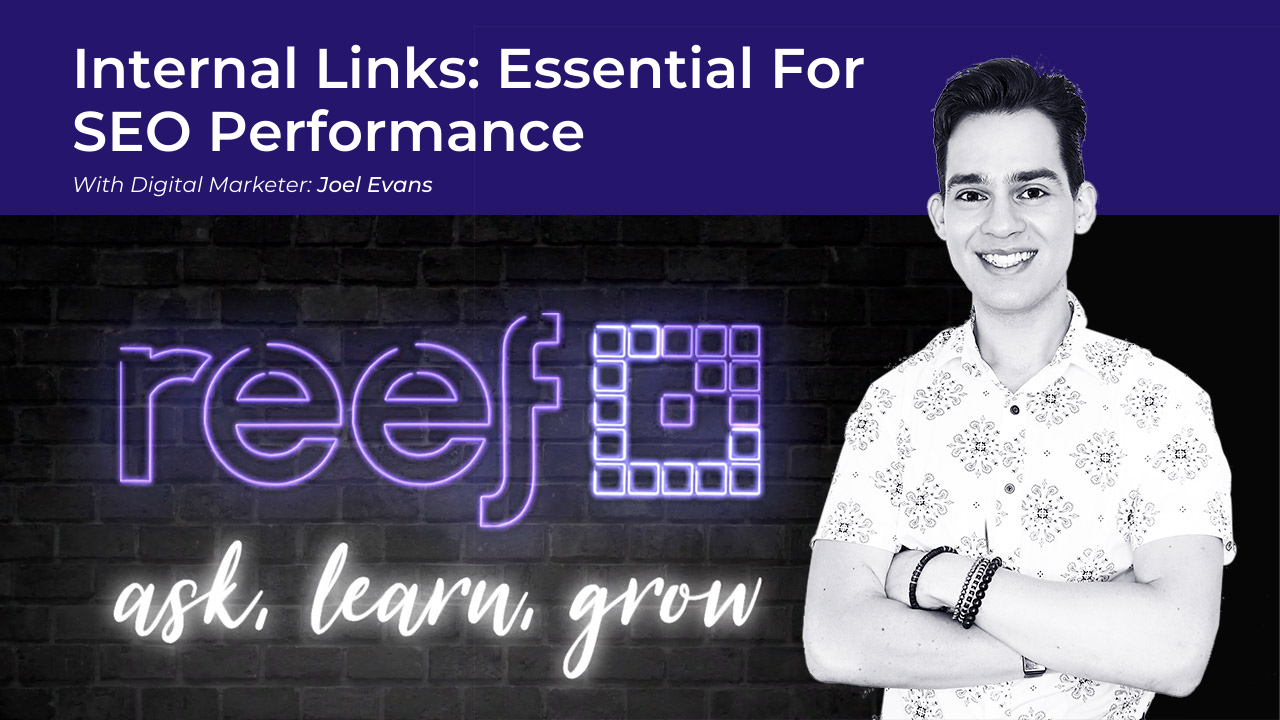Scott Pittman:
Hi everyone. Welcome to another episode of Ask, Learn, Grow. The show where the Reef team answer questions and share updates and insights from the digital marketing industry.
I’ve got Account Manager Joel with me today, and we’re going to be talking about internal links for SEO.
More specifically how and why internal links affect SEO and how you can use internal links to improve your SEO performance.
So Joel, just before we get into the specifics of this, do you want to clarify what we mean when we say an internal link?
Joel Evans:
Yes. So an internal link is a link on your website that points from one of your pages or blog posts to another one of your pages or blog posts.
The reason why we call it internal as opposed to external is because it points to something that’s already present on your website, as opposed to something that is present on somebody else’s website.
Scott Pittman:
Cool. Why are internal links important for SEO?
Joel Evans:
Internal links are important for SEO for a number of reasons
One of them being authority sculpting.
You can use internal links to sculpt the authority of particular pages or pieces of content. The way that you do this is strategically add internal links from pages and blog posts to the page or blog post that you want to improve the authority of.
The reason why this works is because:
The volume of links pointing to an individual page sends a signal to the search engines that this piece of content is of particular importance, compared to the other pieces of content on your website.
Another reason why internal links are important for SEO is crawlability.
When search engine crawlers visit your website, they will follow the internal links from one page or blog post to another page or blog post.
In doing so, this helps them determine the relationship between the different pieces of content that you have, which will then improve your keyword rankings as a result (assuming the pages and anchor text are relevant to the internal link).
If search engines can better understand the relationships between the different pieces of content, they can better understand the relevance of the content to the keywords people are searching and that you want to rank for.
It’s not just about SEO though.
Another reason why internal links are important is for user experience.
Internal links are an indicator to users that they can follow the link to find more content that supports that which they are currently reading, or that it will offer them a related experience.
If the internal links that you have on a piece of content are not relevant to the content on that page, then this is going to create a poor user experience.
So you want to make sure that you’re sending users to the right place with the internal links that you have on a page.
Don’t just add any links. You want to make sure you are adding links that are actually valuable to the user.
Scott Pittman:
How do you use internal links to improve SEO performance and organic visibility?
Joel Evans:
Well, it’s about being strategic.
You don’t just want to add any links, and you don’t just want to add more links. You want to add the right links.
For SEO, you want to make sure that the internal links that you’re using in terms of the pieces of content you’re choosing to link to, are actually relevant to the page or blog post that you’re linking from.
So you don’t just want to link to any old page.
Is the page relevant to the topic or do they have a functional relevance?
For example: You may link to your Contact Us page. That’s irrelevant to the keywords you’re trying to rank for and you’re probably not trying to strategically rank your contact page, but that has a functional purpose.
So look at topical relevance and utility.
Does it have a purpose for being there and is it relevant?
Tick those boxes as a priority, but with those ticked, angle your internal linking towards the pages and keywords you want to rank for. That’s how you’ll improve your keyword rankings with internal links.
You also want to consider the anchor text that you’re using for the links themselves.
You can have buttons, that’s fine, but the best way to improve your organic performance with internal links is with strategic use of anchor text.
You usually don’t just want one word as that often lacks context for the search engines and could be seen as a little spammy in certain cases.
You don’t want the links to always be the exact keyword you want to rank for either.
The keyword can be a part of the internal link in most cases, but mix it up. Variety is key and make sure there’s maybe two to four words in the link.
On the flip side, you also don’t want to make it too large by including too many words in the link text.
It’s just as likely to get picked up as something spammy by the crawlers, in the same way as if it’s a one-word keyword and it doesn’t make for a great user experience either.
So you just want to make sure that your anchor text is varied but relevant and strategic.
Scott Pittman:
Great. So just to recap, before we close up the call:
- Internal links are crucial for SEO, for authority sculpting and making sure authority flows through the site to the right areas.
- Crawlability – so the search engines can follow those links and discover all areas of your site more easily.
- Obviously a good user experience, so you’re going to be referencing topically relevant content where the user can click through to read more about that particular topic or supporting information.
- I guess the part that people will probably care the most about, is that you can use internal links to improve your organic SEO performance as well, when done in the right way.
Great, thanks for sharing Joel.
That kind of wraps up today’s call, so if you’ve got any questions about internal links, SEO, or anything digital marketing related, send those in, and we’re always happy to help.
If you’d like to put a burning question to the team, or see if we can tackle your pressing problem, send those in too, and we’ll see what we can do for a future video.
Don’t forget to subscribe to the channel to be notified of when the next video is available.
Apart from that, thanks all for watching and enjoy the rest of your day.

